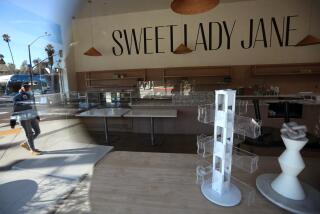Use of Julia Child’s name is focus of legal battle
In her four decades as America’s cooking teacher, Julia Child had a hard-and-fast rule about commercial endorsements: She didn’t do them. It didn’t matter whether it was the butter that made her beurre blanc sauce sing, the pot in which she slow-cooked her cassoulet or even the cookbooks penned by chef friends — her praise was not for sale.
“It was sort of a life philosophy that she had,” said her great-nephew, Alex Prud’homme, who recalled how she frequently remarked: “Your name is your most valuable asset and you should be very careful how it’s used.”
Eight years after Child’s death, her disdain for commercial endorsements is being aired anew in a legal battle pitting her foundation against the makers of what might be described as her occupational right hand — her oven.
At issue in dueling lawsuits filed in recent days is a marketing campaign, launched without the permission of Child’s estate, that touts her use of Thermador appliances decades ago in her home and television kitchens.
The campaign rolled out this year by Thermador, a 96-year-old brand based in Irvine, ranged from a Facebook “like” of its products by “Julia Child, chef” to glossy magazine ads that showed photos of Child and two of the brand’s ovens with the caption, “An American Icon and Her American Icons.”
Both sides agree that there were Thermador appliances on the Boston set where Child filmed “The French Chef” in the 1960s and ‘70s and that she had a Thermador oven in the kitchen of her Cambridge, Mass., residence — a room now displayed as a national treasure at the Smithsonian Museum.
But the sides part on whether Thermador required the approval of the Julia Child Foundation for Gastronomy and the Culinary Arts, the Santa Barbara charitable foundation to which she left her intellectual property, including trademarks, copyrights and the use of her likeness.
Had Thermador asked, the foundation would have denied permission, as it has for others who have approached over the years, foundation officials said.
“The foundation feels really strongly about continuing to conduct itself as Julia would have. And she was adamant that she not personally endorse products or brands,” said Todd Schulkin, the foundation’s intellectual property manager.
When Child rose to prominence in the 1960s, she was joining a field that had a number of TV chefs, including James Beard and Dione Lucas, who pitched products along with their culinary lessons. Prud’homme said Child was wary of anything that would undermine her life’s work as a “teacher of cookery.”
“She saw other chefs … the products they endorsed weren’t always of the highest quality and she saw that could devalue their cultural currency and she didn’t want to fall into that trap,” said Prud’homme, who co-authored the memoir “My Life in France” with Child.
She was unwavering in her refusal to be a pitchwoman, even suing a restaurant that had boasted publicly that it was her favorite.
In the early 2000s, she stopped for dim sum at a restaurant in L.A.’s Chinatown and was asked to pose for photos with the kitchen staff. Child agreed only after every employee had promised that the pictures would never be used for commercial purposes.
The foundation discovered Thermador was using her photos and name this summer. Child’s pop culture cachet has increased since her 2008 death with new books about her life and the 2009 film “Julie & Julia” and the foundation has stepped up vigilance for copyright infringement.
“It took us some amount of time for us to see the extent to which [Thermador and its ad agency] were using that connection and it seemed to develop in magnitude over time,” said Schulkin, a friend of Child.
After demanding that Thermador cease in July, the foundation was approached by DGWB, a Santa Ana ad agency running the campaign, about securing the rights. The foundation’s lawyers refused and told Thermador it planned to file suit, according to correspondence provided by the foundation.
Thermador removed the materials from its website, but its parent company, BSH Home Appliances, filed a suit in Boston on Friday asking a federal judge to make a legal declaration that it had the right to use Child’s connection to the brand in its marketing materials. In its complaint, BSH’s lawyers wrote that the company’s use of Child’s photo and name “do not state or imply any endorsement” but “reflect on the long history, significance and influence of Thermador products on American society and culture.”
Thermador and DGWB declined to comment.
Child’s foundation filed its own suits Monday in federal court in Los Angeles and state court in Santa Barbara, accusing Thermador and its ad agency of misappropriating intellectual property. The suits demand millions of dollars in damages as well as a cut of any profits derived from the invocation of Child’s name be paid to the foundation, a nonprofit that supports culinary causes.
Thermador’s material make “it appear as though Julia Child has been a company spokesman,” the federal suit stated. Child, the foundation’s lawyers wrote, “could have created a lifestyle brand like Martha Stewart or Oprah Winfrey, and endorsed major corporations and product manufacturers, like Thermador and others, for large sums of money.”
“She chose to forego all such commercial opportunities,” they wrote.
Times food editor Russ Parsons contributed to this report.
More to Read
Sign up for Essential California
The most important California stories and recommendations in your inbox every morning.
You may occasionally receive promotional content from the Los Angeles Times.











